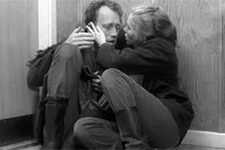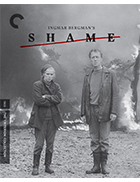Shame (Skammen)
|  War has been a constant theme in the films of Ingmar Bergman, but prior to Shame (Skammen), the wars in his films had been internal. Violence is frequently wrought on sprits and psyches in Bergman’s cinema, but rarely on physical bodies. That all changed with Shame, a provocative and unsettling drama set against the backdrop of a long-running civil war in an unnamed country. Not surprisingly, Bergman is not particularly interested in the war itself, which is why we get virtually no information about who is fighting whom, what the conflict is about, how long it has been going. Rather, he is intrigued by the effects of war on the ordinary people caught in the crossfire. As he put it in an interview around the time of the film’s release, Shame, which was originally made for Swedish television, is about “the misery of the common man when all hell breaks loose around them.” Bergman’s “common man” is embodied in a married couple, Jan and Eva Rosenberg (Max von Sydow and Liv Ullmann, who had just played opposite each other in Bergman’s previous film, 1967’s Hour of the Wolf). Both Jan and Eva are musicians, and they have taken refuge on an island to escape the war on the mainland. They try to create for themselves some semblance of a normal life by growing lingonberries and selling them in town and having coffee and breakfast and tracking down rare bottles of wine. But, the war, uncontainable as it is, eventually finds its way to the island, where Jan and Eva become pawns for both sides, at one point being used for propaganda that makes them appear to be collaborators when they are, in effect, entirely apolitical and genuinely unaware of what is going on in the war (in this regard they are perfect points of identification because we know just as little as they do). At the beginning of the film, Eva is the more proactive of the two, with Jan, a man of great, if sometimes debilitating, sensitivity, playing a meeker role. They squabble as married couples often do, and there is underlying tension that is sometimes covered over by affection, but just as often boils out into the open, suggesting some real fissures that the psychological and physical threats of war will only exacerbate (it is, in its way, as if Bergman has staged Scenes From a Marriage in a war zone). As they become embroiled in the warfare, unable to escape the violence around them, their roles shift. Jan becomes hardened by the experience and more determined to survive, whatever the cost, which necessarily entails his sacrificing a large chunk of his humanity. Eva, on the other hand, seems cowed by the intensity of their situation; she is unwilling to step outside civilized norms, although she does engage in an awkward affair with Jacobi (Gunnar Björnstrand), the local mayor who helps save their lives when one army becomes convinced they were collaborating with the enemy. In his memoir Images: My Life in Film, Bergman minces no words in his assessment of Shame, describing it as a film that “can be divided into two parts. The first half, which is about the events of the war, is bad. The second half, which is about the effects of the war, is good. The first half is much worse than I had imagined; the second much better than I had remembered.” Bergman is, of course, welcome to his own assessment of his work, but his view of the film strikes me as misguided primarily because the film doesn’t split so easily and neatly. Both halves are fundamentally about the events and the effects of the war. When we first meet Jan and Eva, they have already been affected by the events of the war, and those events don’t suddenly stop halfway through the film, but continue to unfold in an unending nightmare that culminates in the couple trying in vain to escape the island on a refugee boat. At all times the war is around them, even when they can’t see it. And, when they (and we) do see it, Bergman paints it with intense visuals, giving us enormous explosions, hellishly burning buildings, and scattered corpses of both soldiers and civilians. The details of the war are ultimately irrelevant; the violence of war is horrific, regardless of the justification of the enterprise, and it cannot be contained. Bergman endured quite a bit of criticism for not being more specific about the nature of the war itself, even though he made it clear he was at least partially inspired by the conflict in Vietnam (which had also played a thematic role in 1966’s Persona). The vague nature of the war feels right, especially all these decades later, as its horrors can be viewed as representative of any number of real-life wars, all of which carry with them the same traumas and the same collateral damage. Like many of Bergman’s films, particularly those made in the 1960s, Shame has a dreamlike quality that transcends the specifics of time and place. Both Jan and Eva talk about their dreams throughout the film, and Bergman and long-time cinematographer Sven Nykvist visualize the horrors of war in ways that are both concrete and compellingly abstract. The film exists in a strange netherworld between political reality and vague allegory, with the connecting tissue being the unshakeable truth that human violence is an appalling flood that can swallow so much in its wake that we forget how or why it even started.
Copyright © 2019 James Kendrick Thoughts? E-mail James Kendrick All images copyright © The Criterion Collection | |||||||||||||||||||||||||||||||
Overall Rating: 


 (3.5)
(3.5)


